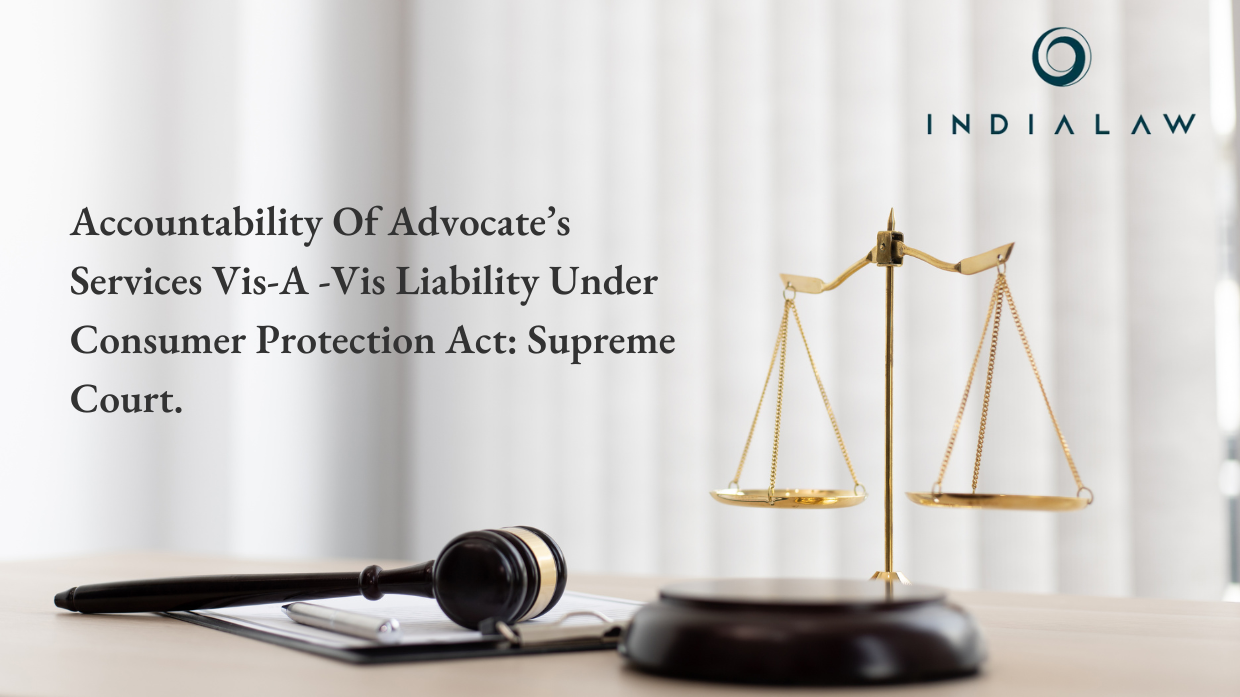Accountability Of Advocate’s Services Vis-A -Vis Liability Under Consumer Protection Act: Supreme Court

The Hon’ble Apex Court in the matter of Bar of Indian Lawyers Through its President Jasbir Sigh Malik vs D.K Gandhi PS National Institute of Communicable Diseases[1] overruled a 2007 judgement of the National Consumer Disputes Redressal Commission which held that the services rendered by Lawyers/ Advocates are covered under section 2 (o) of the Consumer Protection Act, 1986. A bench comprising of Justice Bela M. Trivedi & Justice Pankaj Mithal have clarified that the legal profession involves a fiduciary relationship between the legal professional and their client, distinct from a trader-consumer relationship.
BRIEF FACTS
The Respondent had sought services of the Appellant for filing proceedings u/s 138 of the Negotiable Instruments Act. During the hearing of the said proceedings, certain differences arose between the Respondent and the Appellant, Advocate leading to the Respondent being discontent by the quality of services rendered by the Appellant. Subsequently, the Respondent approached the District Consumer Disputes Redressal Forum, New Delhi but the complaint was dismissed. The Respondent challenging the dismissal order appealed before the State Commission which upheld the decision of the District Consumer Disputes Redressal Forum, New Delhi. The State Commission order was also assailed by the Respondent in a Revision Application filed before the National Consumer Disputes Redressal Commission which allowed the Revision Application and held that services of Lawyers/ Advocates fell under the ambit of the Consumer Protection Act, 1986. The Appellant along with various Bar Associations in the country were aggrieved by the said order of the National Consumer Disputes Redressal Commission and challenged it before the Hon’ble Apex Court.
GROUNDS OF CHALLENGE:
- Whether the Legislature ever intended to include the Professions or services rendered by the Professionals within the purview of the CP Act, 1986 as re-enacted in 2019?
- Whether the Legal Profession is sui generis?
- Whether a service hired or availed of an Advocate could be said to be the service under a ‘contract of personal service’, so as to exclude it from the of the definition of the “Service” contained in section 2 (42) of the CP Act, 2019?
ANALYSIS OF THE SUPREME COURT
The overall objective of the Consumer Protection Act (The Act) as it was re-enacted in 2019 was primarily to ensure that consumers are safeguarded from unfair trade practices and unethical business practices. Furthermore, the aim of the Act is to assure efficient resolution of consumer disputes stemming from inequitable trade and unprincipled business practices and this purpose would be defeated if Lawyers/ Advocates are sued for poor services before Consumer Courts. If all professional services fall under the Act’s scope, it could lead to a surge of legal disputes in the commissions/forums set up under the Act.
The Court held that no professional who is in either medical, legal or in any other such profession would like to be sued or be held liable if there is any misconduct, misdeed causing legal, monetary or other injuries to their clients who are availing their services. Such professionals are governed by their Councils like Bar Councils or Medical Councils through which they can be held accountable for any harm caused due to their negligent actions.
“There was not a whisper in the statements of objects and reasons either the CP Act 1986 or 2019 to include the Professions or the Services provided by the Professionals like Advocates, Doctors etc. within the purview of the Act. It is very well accepted proposition of the fact that Professionals could not be called Businessmen or Traders, nor Clients or Patients be called Consumers. It is also required to be borne in mind that the terms ‘business’ or ‘trade’ having a commercial aspect involved, could not be used interchangeably with the term ‘Profession’ which normally would involve some branch of learning or science. Profession as such would require knowledge of an advanced type in a given field of learning or science, or learning gained by a prolonged course of specialized study” opined Justice Bela M.Trivedi.
The Apex Court has placed reliance on the precedents including R. Muthukrishnan vs. Registrar General, High Court of Judicature at Madras[2] & State of U.P and Others vs. U.P. State Law Officers Association and Others[3] amongst other and reaffirmed that the legal profession is a noble profession and it cannot be equated with other traditional professions and/or commercial activities. The contributions of legal professionals in enhancing the efficiency, value and credibility of the judicial system differs significantly from the services provided by other professionals. The legislative intent of the Consumer Protection Act was never to bring professionals such as Lawyers/ Advocates within the ambit of the Consumer Protection Act, 1986.
CONCLUSION:
In light of this perspective, the Apex Court has overruled the 2007 verdict rendered by the National Consumer Disputes Redressal Commission which erroneously held that services rendered by lawyers and advocates fell under the ambit of the Consumer Protection Act, 1986 (re-enacted in 2019). While doing so, the Apex Court has reiterated the conventional notion that the legal profession is a noble one. Also, it is distinct from other economic activities that are undertaken with a motive to earn profit. It was also noted by the Apex Court that there are self- regulating bodies like Bar Councils that govern the conduct of Advocates. In the event, of any deficiency of service on part of Advocates, the Bar Councils can initiate appropriate action. The Apex Court has also opined that the judgement[4] which includes doctors within the ambit of the Consumer Protection Act, 1986, should also be revisited. Thus, the Court has clarified that there are remedies available to address the concern of deficiency of service by professionals such as Lawyers/ Advocates however, the Consumer Protection Law is not one of them.
[1] 2024 SCC OnLine SC 928
[2] (2019) 16 SCC 407
[3] (1994) 2 SCC 204
[4] Indian Medical Association vs. V.P Shantha 1995 6 SCC 651
By entering the email address you agree to our Privacy Policy.



